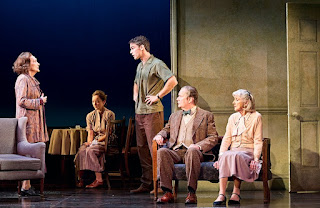Pollock has exaggerated some of his background, but that would be forgivable if he hadn't also just been arrested for making late-night advances to other men. Mrs Railton-Bell rounds up the other residents to take a vote on having him thrown out of the hotel, although it's a formality: What she says always goes.
Still touring at the age of 91, Phillips gets her teeth into the monstrous matriarch as she talks over anyone else who might have an opinion, but for the most part the discussion follows the morality of the times: Most of the residents claim to agree with her, but young father Charles Stratton (Jeremy Neumark Jones) objects on logical if not moral grounds, and the hotel manager Miss Cooper (Lolita Chakrabarti) shows genuine empathy and flat-out refuses to evict Pollock. Although underpinned by viciousness there's also moments of humour here, particularly from the detached Miss Meacham (Richenda Carey) and timid Lady Matheson (Pamela Miles.)
But the heart of this opener actually has a seed of optimism in it, as we get to focus on Mrs Railton-Bell's daughter Sybil (Alexandra Dowling,) bullied by her mother almost into a mental shut-down. It turns out she was closer to the Major than most and feels most personally betrayed, but perhaps the mutual support the two have given each other could help them rise up against the hotel's little tyrant.
Another little tyrant takes centre stage in The Browning Version itself, as Andrew Crocker-Harris (Parker) prepares to take early retirement from his job teaching Classics at a public school. A strict teacher but also a painfully uninspired one, a heart condition has given the school an excuse to get rid of him before he's entitled to a pension, and he's finally forced to confront the fact that not caring if anyone likes him means he's got no safety net. His wife Millie (Chakrabarti) is cheating on him with another teacher (Neumark Jones,) his fresh-faced replacement (Kishore Walker) is already being shown around his quarters, and when a student (Bertie Hawes) actually shows some appreciation for his teaching, it's enough to cause an emotional breakdown.
Both pieces feature an ageing man whose actions - whether because of society's prejudices or his own misjudgement - could leave him with nothing, finding a last, late reserve of strength and defiance. Dacre's production, often underscored by ominous sounds from Valgeir Sigurðsson and Bella Kear, is solid but a little bit flat, something that's particularly evident in Table Number Seven's witch-hunt scene, which can feel like a staccato list of 1950s prejudices*. The Browning Version fares better, although it still doesn't quite have the emotional sucker-punch I've seen the play be capable of before. (Admittedly the Upper Circle of Richmond Theatre had got very cold by this point, which probably wasn't helping me concentrate.)
Pairing the monstrous Mrs Railton-Bell and deliberately cruel Millie also feels like a nasty streak of misogyny you don't usually find in Rattigan to the extent you do in his contemporaries. Summer 1954 is fine, but now that Rattigan's reputation has been well and truly restored, it might be time to start giving him some bolder productions, lest he come across as dusty as he was originally accused of.
Summer 1954: Table Number Seven and The Browning Version by Terence Rattigan continues on tour to Cheltenham and Oxford.
Running time: 2 hours 35 minutes including interval.
Photo credit: Manuel Harlan.
*for the original production Rattigan had to change the Major's offence to him assaulting women, because that was less offensive to audiences than him politely propositioning men






No comments:
Post a Comment